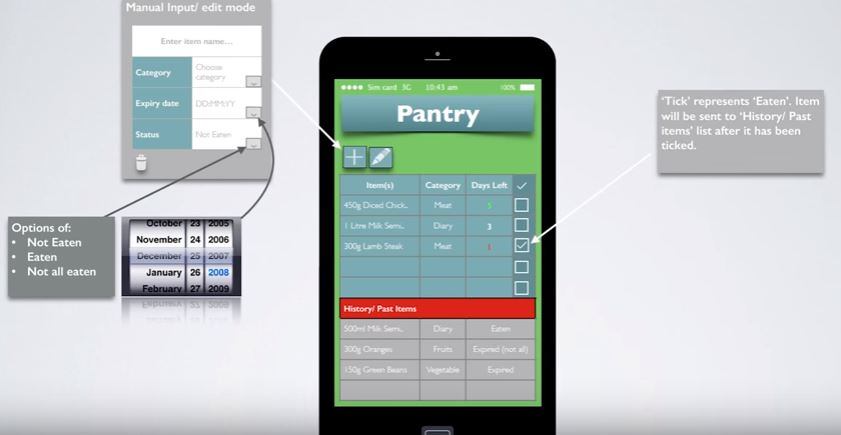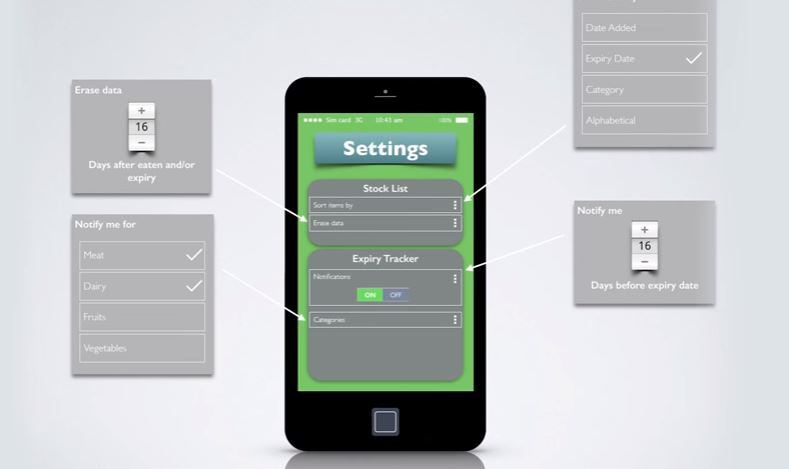Around 60% of food waste generated in the home is caused by items having gone past their expiry date, say the developers, which shows that people find it difficult to manage their own ‘food inventory’ in the home.
The app, dubbed the Pantry, therefore aims to tackle food waste by using techniques more familiar to industry insiders than domestic households. It provides consumers with a stock list which ranks all purchased food; an expiry tracker which sorts products according to their expiry date, best before date or use by date and sends notifications when a product is nearing its date; and recommended recipes based on what needs to be used in consumer’s cupboard, fridge or freezer.

Future versions of the app could even be linked to online retailers' websites so that users can easily purchase additional items needed for a given recipe.
Testing the app on a small group of 10 consumers, the researchers found a 34% drop in food waste across all food types, which would be equivalent to around 1.5 million tonnes of food waste per year if scaled-up for all food types in the UK.
Currently, the UK alone generates about 15 million tonnes of food waste per year according to NGO Waste and Resources Action Plan (WRAP), and almost half of this is attributable to the consumer.
Publishing their findings in Procedia Journal, the authors say it seems "misdirected" that the majority of efforts to reduce food waste by industry focus on reducing internal waste production and not along the remainder of the supply chain - consumers must get involved.
According to lead researcher Elliot Woolley the app allows this to happen: “The app concept presents a fantastic opportunity for the food manufacturing industry to play a greater role in assisting customers in reducing the amount of food they waste by developing tools – already prevalent in the industry – that can be used by the consumer to audit, review and plan the use of their food products.”
Although still at the conceptual stage, Woolley said his team of researchers have proven the principle works, and believes there would be many benefits for retailers such as increased customer loyalty and marketing opportunities.
“For the Pantry app to be most effective, we envisage collaboration with a large grocery retailer could be the way forward if we are to carry out further testing over a longer period with a greater

number of participants."
Information would be collected at the point of sale by scanning the products. "There are a few existing technologies we have identified which could be used to capture this data but they may require changes to labelling, for example, printing barcode at point of packaging,” Woolley told FoodNavigator, while for branded products, manufacturers could also get involved.
The app was designed by researchers at the Centre for Sustainable Manufacturing and Recycling Technologies (SMART), which develops sustainable strategies and technologies for consumer products that meet regulatory requirements as well as ethical and environmental standards – “all whilst safeguarding the future prosperity of manufacturing business,” says the centre’s website.
This year France saw its food waste law come into effect, which requires supermarkets to give all unsold but edible food to charity wither for human or animal consumption, while Italy has also been making legislative moves in a similar direction.
Food waste has also been made a priority at an EU-level with the Horizon 2020 project which will run until 2019, and will work to reduce food waste and waste management costs as well as maximising the value from unavoidable food waste and packaging materials.
Source: Procedia CIRP
First published online, doi: 10.1016/j.procir.2016.01.070
“Manufacturing resilience via inventory management for domestic food waste”
Authors: E. Woolley, G. Garcia-Garcia, R. Tseng, S. Rahimifard
